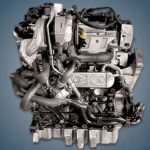The 2.0-liter Volkswagen DFGA 2.0 TDI engine was first introduced by the company in 2016 and is found on such popular crossovers as the second generation Tiguan and Skoda Kodiaq. This diesel engine is distributed only in Europe, in some other markets its EURO 5 analogue DBGC is installed.
The EA288 series also includes: DCXA, CRLB, CRMB, DETA, DBGC, DFGA, DFBA, DAUA.
Specifications
| Production years | since 2016 |
| Displacement, cc | 1968 |
| Fuel system | Common Rail |
| Power output, hp | 150 |
| Torque output, Nm | 340 |
| Cylinder block | cast iron R4 |
| Block head | aluminum 16v |
| Cylinder bore, mm | 81 |
| Piston stroke, mm | 95.5 |
| Compression ratio | 16.2 |
| Features | DOHC, intercooler |
| Hydraulic lifters | yes |
| Timing drive | belt |
| Phase regulator | no |
| Turbocharging | Mahle BM70B |
| Recommended engine oil | 5W-30 |
| Engine oil capacity, liter | 5.7 |
| Fuel type | diesel |
| Euro standards | EURO 6 |
| Fuel consumption, L/100 km (for Volkswagen Tiguan 2017) — city — highway — combined |
7.5 5.0 6.0 |
| Engine lifespan, km | ~310 000 |
The engine was installed on:
- Skoda Kodiaq 1 (NS) since 2016;
- Volkswagen Tiguan 2 (AD) since 2016;
- Volkswagen Touran 2 (5T) in 2015 – 2020.
Disadvantages of the VW DFGA engine
- Owners on specialized forums most often discuss strange sounds and vibrations at work;
- Also periodically there are complaints about oil and coolant leaks;
- The timing belt lasts a long time, but requires attention, because when it breaks, the valves bend;
- On long runs, a particulate filter delivers a lot of trouble, as well as an EGR valve.






